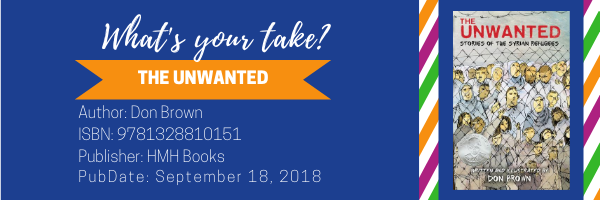By Michele Ebersole, University of Hawaii, Hilo, HI, and Yoo Kyung Sung, University of New Mexico, Albuquerque, NM
This month, Michele and Yoo Kyung give their takes on rethinking cultural and physical borders in children’s literature to understand today’s global politics through history. In week two, they share The Unwanted by Don Brown.

MICHELE: One of the first elements that struck me about The Unwanted is the power of the graphic novel to tell stories. The shocking images along with informative captions and tone that are communicated through speech bubbles and provide the reader with a compelling experience. These stories show that there is much pain, struggle and fear, and at the same time, a deep sense of strength, courage and bravery.
Sometimes it may be difficult for us to connect or understand issues that are foreign or disconnected to our own lives. This text makes the Syrian refugee experience come alive and unlocks the potential to move us in an emotionally powerful way. When reading it for the first time with another reader, the initial response was, “I didn’t know.” I had the same reaction. While we may hear and have heard about Syrian refugees on the news, we don’t always “know” or feel the human suffering that accompanies such atrocities and can choose to remain distant and uninformed about issues that are occurring around the world. At times, we may not be moved to know or empathize with issues that are occurring elsewhere and caught up in our worlds. I believe that this text helps us see with new eyes.
YOO KYUNG: The beauty of the graphic novel is textual simplicity and subsequent language impact on visual textuality. Don Brown seemed to have conducted thoughtful research for this book and did an excellent job. He orchestrated informational texts that display a powerful message with informative statistics with simple yet empowering narratives in his texts, which get rich supports from visual texts. The delivery of information is clear and powerful when visual images meet expository texts with personalizable narratives from voices in panels and speech bubbles. I also appreciate how Syria is portrayed as a peaceful country at the beginning of the story. The first page starts with a beautiful garden where a little girl holds a flower bouquet and beautiful buildings and Syrian style architecture reminds me of that Syria is one of the ancient cities that have rich cultures and historical backgrounds. However, Syrians’ politics and a dictatorship that made selfish political decisions caused life-threatening situations for Syrians. Syrian people had to leave their country to survive. Border issues and transnational politics and oppressions are well-depicted with startling information in numbers and informative narratives. I may sound cynical, but The Unwanted makes me think how a fine country with so many histories and cultures can fall apart when the nation’s leadership is weak, selfish and wrongful reflecting today’s America. Going through COVID-19 and confusing messages from the leadership somewhat resemble Syrians’ cause of the tragedy, which may be as surreal as once upon a time fantasy, yet this is the reality that many Syrians still experience through a hard refugee life. Their American-born children are permanent ELL students speaking no English at home. Just like Between Us and Abuela, The Unwanted raises social awareness and asks us to enhance empathetic interest in transnational families who once were refugees now they are new Americans with their relocation in the U.S.
Title: The Unwanted: Stories of the Syrian Refugees
Author: Don Brown
ISBN: 9781328810151
Publisher: HMH Books
PubDate: September 18, 2018
Throughout August 2020, Michele and Yoo Kyung give their take on books for young people to rethink cultural and physical borders. Check back each Wednesday to follow the conversation!
- Themes: Don Brown, Michele Ebersole, Unwanted, Yoo Kyung Sung
- Descriptors: Books & Resources, My Take/Your Take
